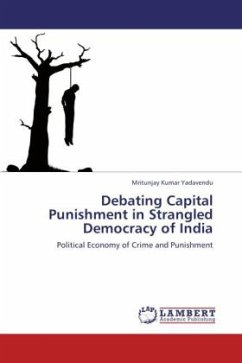The book is a critical engagement with various debates regarding capital punishment with special reference to India. It probes the two broad approaches viz. abolitionist and retentionist through a complex unpacking of the arguments surrounding death penalties awarded to Afzal Guru (Parliament Attack Case) and Dhananjoy Chatterjee (rape and murder) by the Indian State. The book also analyze how along with the State s ideological apparatuses the corporate media through a complex process of profiling of the accused, presented a dehumanizing profile of the accused and the community/communities they belonged to. Media became a potent field in getting the final consensus for the death awardees. The book concludes that an abolitionist position needs to move beyond a moral, humanist or utilitarian approach since they often overlook the systemic inequities which target individuals differently.
Bitte wählen Sie Ihr Anliegen aus.
Rechnungen
Retourenschein anfordern
Bestellstatus
Storno








